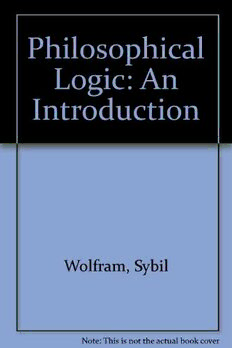Table Of ContentPHILOSOPHICAL LOGIC
Philosophical logic addresses fundamental questions about truth
and meaning. Often considered oneofthe most intellectually
demandingofsubjects, it provides a basis for muchofwhatis
discussed in philosophy and other fields. This book provides a first
introduction to the subject. Lucid, up-to-date, and comprehensive,
it is based on over twenty years oflectures given by the authorat
Oxford University.
Sybil Wolfram introduces philosophical logic primarily by
focussing on a numberofrelated topics and issues in it, describing
views held about them, arguing about them, and generallyoffering
an opinion on ways ofclarifying or resolving them. She shows by
example how to set about considering the kinds ofquestions that
philosophical logic addresses. Questions at the end ofchapters are
designed to encourage going beyond what she has written;
suggested reading frequently contains otherviews not necessarily
discussed in the text.
Written simply and clearly, employing as few technical terms as
possible, PhilosophicalLogicassumes no prior knowledge ofeither
philosophy or logic. It is designed for use as the basis for a one- or
two-term undergraduate course, and will be ofinterest to anyone
concerned with understanding the most fundamental intellectual
questions.
Sybil Wolfram is University Lecturerin Philosophyatthe Universityof
Oxford
PHILOSOPHICAL
LOGIC
An introduction
SYBIL WOLFRAM
,~
ROUTLEDGE
LONDON AND NEW YORK
Firstpublished 1989
byRoutledge
2ParkSquare,MiltonPark,Abingdon,
Oxon, OX144RN
270Madison,AveNewYorkNY 10016
Routkdge is an imprint ofthe Taylor (5 Francis Group
TransferredtoDigitalPrinting2005
© 1989Sybil Wolfram
Typeset by Columns ofReading
All rights reserved. Nopartofthis bookmaybe
reprinted orreproducedorutilizedinany form or
byanyelectronic, mechanical,orothermeans, now
knownorhereafterinventt,ad,includingphotocopying
and recording,orin anyinformationstorageor
retrievalsystem,without pennission inwritingfrom
thepublishers.
BritishLibraryCataloguinginPublicationDala
Wolfram, Sybil
Philosophical logic: an introduction.
I. Philosophical logic
I. rride
160
ISBN0415023173
ISBN041502318 I Pbk
LibraryofCongress Gata/oginginPublicalionData
Wolfram, Sybil, 1931-
Philosophical logic.
Bibliography: p.
Includes index.
1. Logic. I.rritle.
B(~7I.W65 1989 160 88-23963
ISBN0415023173
ISBN041502318 I (pbk.)
TO STEPHEN AND CONRAD
This page intentionally left blank
CONTENTS
Preface
Xl11
CHAprrER 1INrrRODUCTION 1
Section 1 What is philosophical logic? 1
1.1.1 Philosophical logicand formal logic 1
Two sorts oflogic - Propositional calculus and
philosophical logic - Examples -
Predicate calculus and philosophical logic - Exanlples
1.1.2 Philosophical logicand philosophy 6
Exampl~s
1.1.3 Philosophical logicin itsown right 8
Section 2 Some preliminaries 10
l.2.1 Validity, consistency and soundness 10
\'alidity and invalidity - Consistency and inconsistency
Soundness and unsoundness - Good and bad
arguments
1.2.2 Sufficient and necessary conditions 15
l'he terms explained - Sufficient vs necessary
conditions - Relation ofsufficient and necessary
conditions - 'Logically' vs 'contingently' sufficient or
necessary conditions - 'Causally' sufficient and
necessary condidons - Inferellces based on necessary
and sufficient conditions
1.2.3 Problenls about proof 21
Notes to Chapter 1 22
Questionsandsuggestedreading 24
CHAP1~ER 2 REFERENCE AND TRUTH VALUE 26
Section 1 Typography, meaning, and whatis stated 26
vii
CONTENTS
2.1.1 Words 26
'roken and type words - Words with a meaning
'Vords with the same meaning - Different 'word counts'
- Problems about the word 'word'
2.1.2 Sentences 31
'fokcn sentences - ·fhe 1l1eaning ofsentences -
Sentence ambiguity and synonymy - 'Propositions'
2.1.3 Statements 35
l~he sentence-statement distinction - COl1ntin~
staternents - Meaningful sentences that do not make
statements
Section 2 The problem ofthe KingofFrance 39
2.2.1 Howshould 'The KingofFrance is wise' beanalysed? 39
l'he problem - l~he 'rheory ofDcscriptions - 'rhe
'""hcory of Presupposition
2.2.2 Relerencefailure and the Neglected Case 43
'I\vo sorts ofcase - The Ne1{lected Case - Should
\ve introduce a third truth value? - Some implications
of the Neglected (~ase- Failure ofreference
Non-radical reference failure - 'Identifying
references', 'inessential', and 'referential' uses of
expressions - Radical reference failure - When do
nleaningful declarative sentences fail to make
statenlcnts? - \\That kinds ofexpressions can fail
radically to refer?
Section 3 Vocabulary ofreference 52
2.3.1 Dcfiniteand indefinitereference 52
2.3.2 Expressions nlakingdefinite references 53
2.3.3 Referring expressions S5
Different uses of'referring expression' - Relations
ofuses - Choice ofusc - References to particulars vs
references to non-particulars
2.3.4 Rigid and nonri~idd~signat()rs 60
Strongly rigid, not stron~ly rigid and nonri~id
Designators and reference - Advantages and problenls
Section 4 Should weadmitstatements? 63
2.4.1 The initialcase for staterncnts 63
()ne sentence/proposition, many statelnents - One
statenlcnt, many s(~ntences/propositions
2.4.2 ()bjections tostaterrlcnts 65
Ar~ type statenlents superfluous? - l'ype statements
and criteria ofidentity - l""ype staterncnts and
referential opacity - l'ypc statements and asscrtions
2.4.3 'I'wocommentsabout statenlents 71
~lultipli('ation ofentities? - l~rutll conditions
viii
CONTENTS
Notes to CYhapter2 72
Questionsandsuggestedreading 76
CHAprrER 3 NECESSARY TRUTH AND THE
ANALY1'IC-SYNTHErrIC DISTINCrrION 80
Section 1 Map ofdistinctions andtheories 80
3.1.1 'Necessary' and 'contingent', 'analytic' and 'synthetic',
'apriori' and 'empirical' 80
3.1.2 l"hree theories about necessary truth 82
Section 2 Conventionalism 85
3.2.1 l'heLogical Positivist picture 85
Division ofpropositions - Division oftruths - 1'he
role ofambiguity
3.2.2 Self-evidenceand logical truth 88
Self-evidence - Logical truths
3.2.3 Necessityand certainty 91
Examples considered - Perception is unreliable
Section 3 Scepticism 93
3.3.1 Necessary truth and referential opacity 93
Positivist conventionalism and reference - Quine's
Necessity Argument - What does Quine's Necessity
Ar~ument show? - Necessary truths and non-analytic
propositions - Contingent truths and analytic
propositions - Prenlise 2 ofQuine's Necessity Argulnent
revised - 'Analytic' and 'necessarily true' - Premise 1
ofQuine's Necessity Argument revised - Positive
results ofQuine's Necessity Argument
3.3.2 Jlefinitions of'analytic' 102
Relation ofNecessity and Analyticity Argutnents
Quine's i\nalyticity ArKunlcnt - Two discarded
d~finitionsof'analytic' - Three groups ofdefinitions
of'analytic' - Use of'analytic'
Section 4 Essentialism 110
3.4·.1 Kripkc's necessary truths 110
3.4-.2 What is essentialism? 112
'Essentialism': sense I (not analytic) - Sense 2 (not
meaning- ofwords) - Senses 3a (objects) and 3b
(particulars)
3.4.3 Kripke'sweaksenseof'necessarily true' I16
3.4.4 In what senseis Kripkran essentialist? II7
Kripke's old-stylejustification - Kripkc's new-style
justification - Kripke's sense of'necessarily true' and
essentialistn - necessary truth and Kripke's csscntialislll
ix

